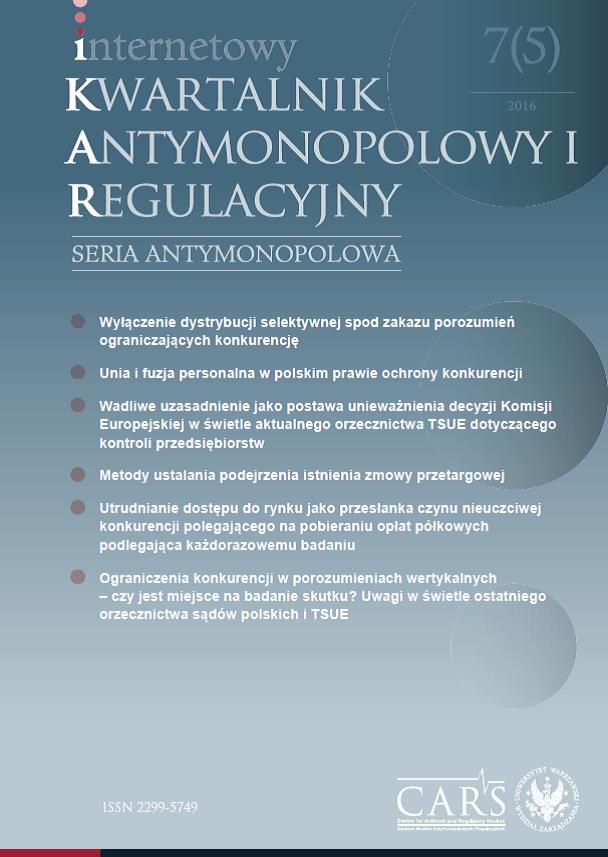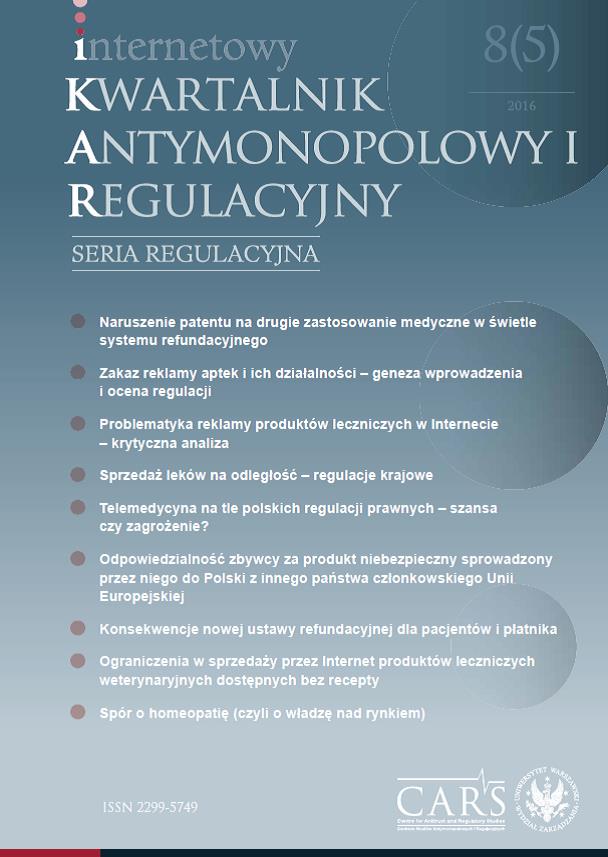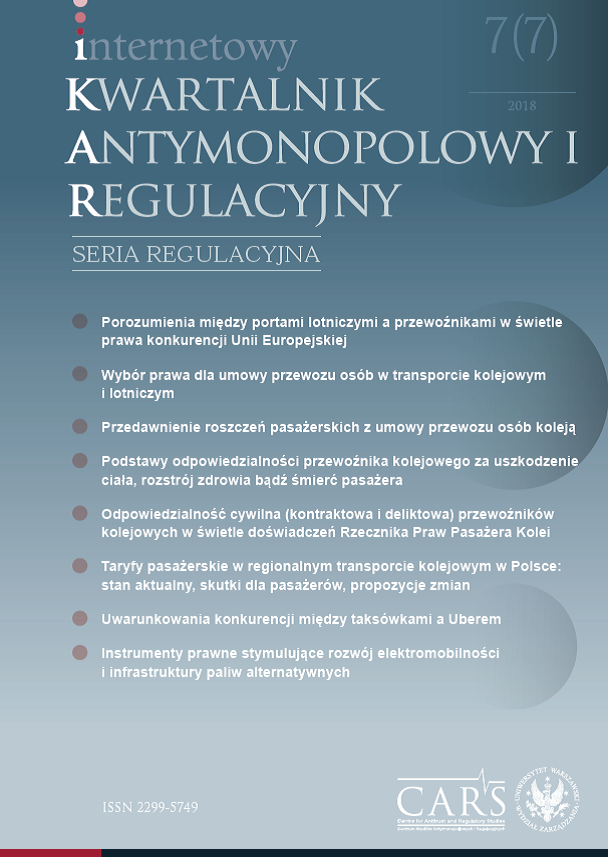
We kindly inform you that, as long as the subject affiliation of our 300.000+ articles is in progress, you might get unsufficient or no results on your third level or second level search. In this case, please broaden your search criteria.




The article presents binding legal provisions on the retail distribution and mail-order sales of veterinary medicinal products, which are the basis of the interpretations used by the Polish veterinary inspection and administrative courts whereby Internet sales of OTC veterinary medicinal products are not allowed under Polish law. The paper presents the legal background of this issue in order to assess the correctness of existing jurisprudence in this case. Additionally, the article comments on the expected changes to existing law in this field drafted at the EU level
More...
The article discusses the effects of rulings issued by the Court of Competition and Consumer Protection (SOKiK) and the Court of Appeal concerning homeopathy upon the scope of the powers of medical self-government to regulate markets. The author provides an analysis of these powers on the basis of competition law, since the latter intersects with pharmaceutical law and laws regulating the professional activities of doctors. The author draws attention to the fact that depriving the competition authority – the UOKiK President – of the power to scrutinize the activities of professional self-government bodies may lead to adverse effects for competition and consumers protection. These would consist of the limitation of the freedom of market access of undertakings as well as limit consumers’ free choice to access legally sold products and services.
More...






Agreements between airports and carriers, similarly to all vertical agreements, can cause harm to the market, primarily when the balance between the undertakings concerned is disturbed and dependence emerges. In air transport, such relationships have been considered largely through the lens of State aid law, since the subsidization of airports makes its activities imputable to the State. Recourse to competition law – namely Articles 101 and 102 TFEU – should be perceived as an alternative, required in the light of the gradual withdrawal of State funding for airport operations. This paper provides an overview of the anticompetitive mechanism highlighted above, explores possibilities and challenges for the application of competition rules as well as provides de lege ferenda conclusions
More...
This paper analyses the choice of law rules for contracts of carriage of passengers under Regulation (EC) No 593/2008 of the European Parliament and of the Council of 17 June 2008 on the law applicable to contractual obligations (Rome I). While the Rome Convention did not contain any special rules for such contracts, the Rome I Regulation adopts a restricted form of party autonomy for the carriage of passengers. The parties are restricted to choosing between the country of the passenger’s habitual residence, the carrier’s habitual residence, the carrier’s place of central administration, the place of departure or the place of destination. The inclusion of a special choice of law rule for such contracts in the Rome I Regulation resulted from the desire of a number of Member States to ensure an adequate level of passenger protection. However, the achievement of this protection goal by way of limited choice of law is doubtful.
More...
The contract of carriage of passengers by rail is governed by EU law, as well as national and international law, which shall apply to both national and international transport operations. This raises a question, inter alia, about the correct application of the rules on time-barring passenger claims against carriers. In principle, this is not regulated by EU law. However, EU law largely incorporates the CIV Convention, which regulates the limitation periods for claims. Part of passenger claims is directly covered by the CIV Convention; there is no doubt that the provisions of the convention should apply to them. On the other hand, a problem arises with regard to those issues governed by the CIV Convention which are modified or supplemented by the provisions of Regulation (EC) No 1371/2007, as well as with regard to claims based solely on that Regulation. Similar doubts also exist in other modes of transport, such as aviation law, where they have been the subject of several CJEU rulings. The aim of this paper is to present the above mentioned issues on the ground of rail transport and answer the question to what an extent the position developed in aviation law is adequate for rail transport. In the opinion of the Author, a direct transfer of views developed with regard to air transport should not take place because of the different way of the implementation of the international convention into EU law, and different scope of the provisions governing the limitation period in the Montreal convention and the CIV convention
More...
The Rail Passenger Rights Ombudsman is competent to conduct out-of-court resolution of disputes between entrepreneurs operating on the railway market and passengers. The aim of the article is to present the legal aspects of contractual and tort liability regarding the issues that have been resolved by the Rail Passenger Rights Ombudsman.
More...
Regional railway transportation in Poland in the second decade of the 21st century is characterized by a remarkable complexity of tariff solutions. This is primarily caused by the existence of many train operators with their own tariff systems as well as ‘territorially restricted’ tariffs applied by one or more operators. The above status quo may greatly affect the decisions of passengers regarding their railway journeys. The first issue connected with those decisions results from the often complicated rules of cross-operator ticket acceptance (unilateral, bilateral, sale channel-dependent, none). Another issue lies in perceived discrimination in access to tariff information and sale of certain types of tickets, resulting from the way in which train operators’ internet sale systems operate (which, besides their sale functionality, can also be used for informational purposes). Those systems do not provide timetables and pricing information on connections partially or entirely served by other operators, even if they accept tickets issued by the given operator. A similar problem may occur even in case of pricing connections offered by a single operator. The cheapest possible tickets – even when available online – may not be offered ‘automatically’ and passengers have to select them ‘manually’ on the basis of pre-existing knowledge of pricing rules. Information about some pricing options may be available in text documents only and not implemented in sale systems. An improvement of availability of tariff information in the cases mentioned above can be achieved in two ways. The first one refers to ‘multi-operator’ connections and can be described as extending information obligations of train operators to cover all the connections for which they sell tickets. The second refers to the sometimes unavailable ‘automatic’ pricing of the cheapest tickets for connections offered by a single operator. It consists of ‘redesigning’ the rules of construction of ‘territorially restricted’ tariffs towards their utilization – already built-in in the internet sale systems – the rules of pricing tickets for journeys on trains of various categories.
More...
In this article the Authors present the issue of social research as an example of processes which make it possible to measure standards based on both internal and external regulations. Knowledge accumulation following recurrent or complementary research allows an organisation to take an advisory role during legislative processes on various levels. The Authors indicate critical stages of the research methodology forming, and describe examples of satisfaction tracking and mystery shopper research which play a central role for competitiveness on contemporary markets
More...
Technological development leads to the blurring of divisions between traditional forms of transport, creating opportunities for the development of new services. The start of Uber services is one of the examples of the use of ICT technologies and the implementation of the principles of the sharing economy. For public opinion, Uber services have been recognized as a direct competitor for taxis. Although the legal conditions favor taxis in urban traffic, the technological solutions have enabled Uber to build a competitive advantage. Legal frameworks, if a given country has not equated Uber with taxis, may be a factor increasing the competitiveness of taxis, especially those associated with modern applications such as MyTaxi, iTaxi or partly Taxify. The paper analyzes the legal conditions of the taxi system in Poland, pointing to potential advantage points
More...
This article provides a synthesis and evaluation of the most important legal tools which stimulate the development of alternatives fuels infrastructure. The Author analyses legal acts which support the development of the alternative fuel based transportation sector, with particular emphasis on the new electromobility and alternative fuels law and the bio-components and liquid bio-fuels law. The analysis revealed regulations which still hold back the promotion of electromobility and alternative fuels. In the Author’s opinion, applied legal solutions eliminate the most potent barriers to the development of this new sector, although they still seem insufficient with regards to the goal set out in governmental documents.
More...